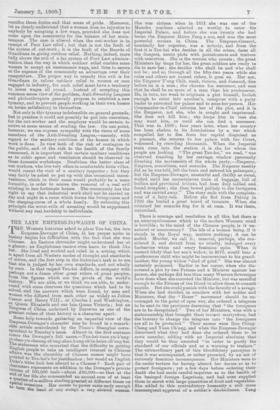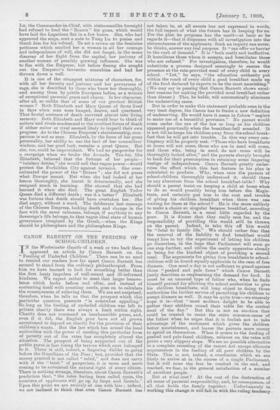THE LATE EMPRESS-DOWAGER OF CHINA. T HE Western historian asked to
place Tzu-hsi, the late Empress-Dowager of China, in her proper niche in history begins his difficulties with the fact that she was Chinese. Au Eastern chronicler might understand her at a glance ;an Englishman cannot even learn to think like her. She lived and worked and ruled in a setting which is apart from all Western modes of thought and. standards of action, and the first step in the historian's task is to see that she is judged by her own standards, and not wholly by ours. In that respect Tzu-hsi differs, in company with Perhaps not a dozen other great rulers of great peoples, from the figures which are the pivots of the world's history. We are able, or we think we are able, to under- stand with some clearness the questions which had to be solved, and the answers which were found, by men and women who differed from each other as widely as Julius Caesar and Henry VIII., or Charles I. and Washington, or Queen Elizabeth and our late Queen Victoria ; but an Empress of China acclaimed by Easterns as one of the greateet rulers of their history is a character apart. Some help towards gathering an impartial view of the Empress-Dowager's character may be found in a remark- able article contributed by the Timee's Shanghai corre- spondent to Tuesday's issue. Almost in the first sentence comes the Dowager's full name,—Tzu-lisi-tuan-yu-k'n,ng- Yi-chao-yu-chuang-ch'eng-shou-kung-ch'in-hsien-ch'ung-hsi. T,Ils statesman who remarked that the difficulty in getting 'nglisli people to take an intelligent interest in Chinese affairs was the absurdity of Chinese names might have Pointed to Tzu-hsi's for justification ; but would. an English. 1?uke'5 titles look less absurd to a Chinese P Each pair of Frutraeters represents an addition to the Dowager's private ulcorae of 100,000 taels—about £30,000—so that at the and of her life she commanded an annual sum of at least quarter-of-a-million sterling granted at different times on Special occasions. Her access to power came early enough to turA the head of auy except a very shrewd woman. She was sixteen when in 1851 she was one of the Manchu maidens selected. as worthy to eater the Imperial Palace, and before she was twenty she had borne the Emperor Hsien Fong a son, and was the most powerful woman in China. The Empress-Consort, nominally her superior, was a nobody, and from the first it is Tzu-hsi who decides in all the crises, faces all the dangers, meets plots with punishments and traitors with execution. She is the woman who counts ; the great Ministers lay traps for her, the great soldiers are ready to die to save her ; she decides who shall be and who shall not be ; and so, through all the fifty-two years while she rules and others are named rulers, it goes on. Her son, the Emperor rung Chih, weak, vicious, and diseased, dies before he is a man ; she chooses his successor, and sees that he shall be no more of a man than his predecessor. He, in turn, too weak to originate a plot himself, foolish enough to enter into another's, conspires with a party leader to surround her palace and to seize her person. Her Commander-in-Chief informs her of the plot, and. it is the Emperor, not she, who is caught and imprisoned. She does not kill him ; she keeps him in case she may want him, or until she can find a successor. That was in 1898; four years later, when her country has been shaken to its foundations by a war which compelled her to flee from her capital disguised as a peasant, she returns to her palace with her Court, welcomed by crowding thousands. When the Imperial train rune into the station it is she for whom the people are looking. "The great Tzu-hsi," we read, "was observed standing by her carriage window personally directing the movements of the whole party,—Emperor, Empress, concubines, and eunuchs. The Emperor meekly did as he was told, left the train and entered his palanquin ; but the Empress-Dowager, masterful and thrifty as usual, waited. until her mountainous train of baggage, full of bullion and provincial tribute, had. , been duly tallied. and . found. complete; she then bowed politely to the foreigners and. was carried away." The story ends with the complete.. , ness of a fairy-tale. Before she fled. from Peking in 1900 she buried. a great hoard of treasure. When, she returned her eunuchs dug for it at once. It was there, untouched.
There is courage and. resolution in all this, but there is an unscrupulousness which to the modern Western mind is horrible ; to the mind of the Chinese people, is it un- natural or unnecessary P The life of a human being, if it stands in the Royal way, matters nothing ; it can be ended. Murder, we call it; removal, perhaps, she con- sidered it, and shrank from no cruelty, indulged every barbarous whim and every feminine spite. When it seemed likely that her son's widow, in 1875, would bear n, posthumous child 'who might be inconvenient to his grand- mother, the young widow "died of grief." She was almost certainly poisoned. Earlier in her career, when 'she dis- covered a plot by two Princes and. a Minister against her person, she perhaps did less than many Western Sovereigns have done when she executed the Minister, but was merciful euough to the Princes of the Blood to allow them to commit • suicide. But she could. punish with the ferocity of a savage. When she had decided, in conclave with her nobles and. Ministers, that the " Boxer " movement should be en- • couraged to the point of open war, she ordered. a telegram to be seat to the provinces decreeing that "the foreigners are to be decapitated." Two of her Ministers, wise with a statesmanship that brought them instant martyrdom, had ' the bravery to change the telegram into "the foreigners are all to be protected." Their names were Hsu Ching- • Cheng and Yuan Ch'ang, and. when the Empress-Dowager discovered. what they had done she ordered them to be sawn asunder, adding with an Imperial aloofness that they would be thus executed "in order to purify the standard of our officials and as a warning to traitors." The extraordinary part of this bloodthirsty paroxysm is that it was accompanied, or rather preceded, by an act of curiously feminine inconsequence. Her Ministers were to die under torture for having altered her decree so as to protect foreigners ; yet a few days before ordering their death she had made careful inquiries as to the health of the besieged foreign Legations, and had even supplied , them in secret with large quantities of .fruit and vegetables. She added to this contradictory humanity a still more inconsequent epproval of a soldier's disobedience. Yung • Lu, the Commander-in-Chief, with statesmanlike foresight had refused to lend the " Boxers " his guns, which would have laid the Legations flat in a few hours. She, who had approved the siege, sent a note to Yung Lu to praise and thank him for his refusal. To set a crown on the feminine pettiness which marked her a woman in all her courage and independence of will, she did not forget, in the mean disarray of her flight from the capital, her jealousy of another woman of possibly growing influence. She was to flee with the Emperor, but before fleeing she sought out the Emperor's favourite concubine and had her thrown down a well.
It is one of the strangest mixtures of characters, for, with all her ferocity and jealousy and her paroxysms of rage, she is described by those who knew her thoroughly, , and among them by gentle European ladies, as a woman of exceptional personal grace and charm. Is her character, after all, so unlike that of some of our greatest British women ? Both Elizabeth and Mary Queen of Scots lived in days when men were hanged, drawn, and quartered. That brutal sentence of death survived almost into living memory. Both Elizabeth and Mary could bear to think of suitors and rivals condemned to the cruellest forms of death if either suitor or rival seemed likely to imperil their own progress. As to the Chinese Empress's statesmanship, corn- parison is not so easy. Elizabeth, by the force of her great personality, her ability to use the best of her counsellors' wisdom, and her good luck, remains a great Queen. But she, too, could be improvident. We had no gunpowder for a campaign when we broke the Armada. Tzu-lisi, like Elizabeth, believed that the fortune of her people- " tutelary deities," she would call that vague power—would protect the Forbidden City against invasion. She over- estimated the power of the " Boxers " ; she did not guess what Europe meant. But when she had looked at her lesson thoroughly, she learnt it determinedly, and she resigned much in learning. She showed that she had learned it when she died. The great English Tudor Queen died a different death ; was it a better? Elizabeth was furious that death should have overtaken her. She died angry, without a word. The deliberate last message of the Chinese Empress, looking death and change in the face with the same calmness, belongs, if anything in any Sovereign's life belongs, to that vague ideal state of human governance imagined by the Greek,—when the Kings should be philosophers and the philosophers Kings.













































 Previous page
Previous page